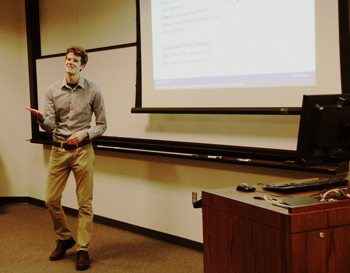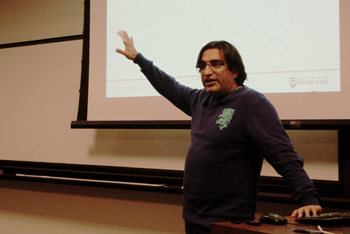
Mitchell Faulk
The students from Scientia, the undergraduate journal of scientific research, host a monthly seminar series called Talk Science that highlights the work of undergraduate and faculty researchers at Notre Dame. This month’s presenters were senior mathematics major Mitchell Faulk and Nitesh Chawla, the Frank Freimann Collegiate Associate Professor of Engineering in the Department of Computer Science and Engineering.
Mitchell Faulk gave a presentation titled, “Vertex Operator Algebras: Algebraic Realizations of the Geometry of String Theory.” Faulk presented his research along with a background on string theory, the topic on which his research is based. Faulk works with Katrina Barron, associate professor of mathematics, and received a College of Science Summer Undergraduate Research Fellowship to work on his research with Baron. His research is also part of his participation in the Seminar for Undergraduate Mathematics Research (SUMR).
Since studying both open and closed interactions in string theory is too broad of a topic to cover, Faulk focused his talk on closed vibrating strings and their interactions. These strings sweep out surfaces called world sheets. In Faulk’s research project, only world sheets without holes up to conformal equivalence were studied. The data from a world sheet without holes (up to conformal equivalence) can be given by a “sphere with tubes." In addition, these world sheets can also be “sewn” together (to model interactions). Faulk then dealt with translating spheres and sewing into algebraic objects and multiplication.

Prof. Nitesh Chawla
One idea for classifying vertex operator algebras is to simplify these complicated algebraic objects, yet still keeping enough structure for classification. A particular method of simplification is called Zhu’s algebra construction, which is what Faulk studied last summer. Faulk’s research dealt directly with what structure Zhu’s construction preserves and if it preserves the tensor product. His research revealed that it does indeed preserve the tensor product.
Nitesh Chawla’s area of research focuses on data and network science. Chawla is at the forefront of interdisciplinary applications with leading data science work in healthcare informatics, social networks, and analytics.
“2.594 trillion dollars are going towards healthcare. Why are we not healthier as a nation if that much money is being spent on healthcare?” Chawla asked.
In response to this problem, Chawla hopes to start identifying different lifestyles and use data to show how making changes in a lifestyle can impact a person’s health. . The main goal is to empower the consumer to become “the CEO of their own health” by algorithmically creating a user model where this type of impact can be made.
Chawla’s research group is making transformative advances in personalized health care and wellness by connecting data, algorithms, social networks and people. The research program is being piloted with a diverse group including seniors, diabetic population and middle school students.
Talk Science provides a fun, informal, and stimulating environment for all undergraduates to learn about research in the College of Science. If any undergraduate students are interested in getting involved in Scientia, contact the editors, Rachel Cotton and Rebecca Marton.
Originally published by at science.nd.edu on November 19, 2013.
